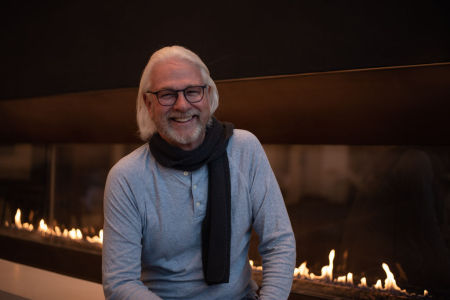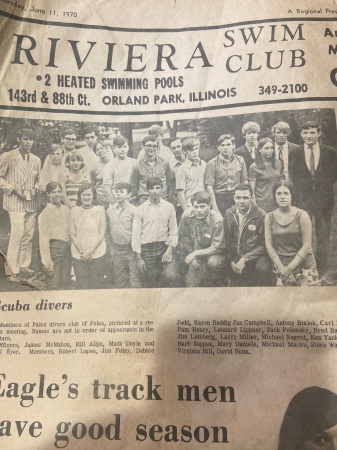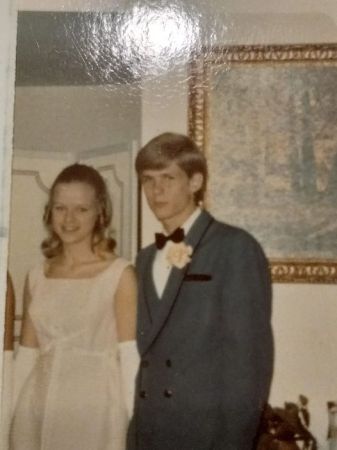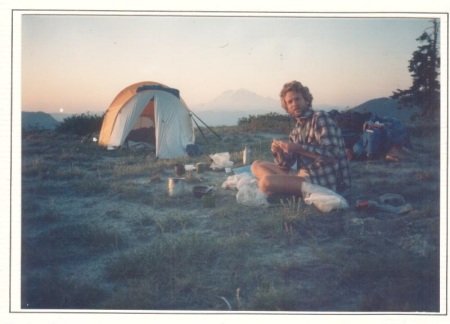James McMahon:
CLASS OF 1969

Carl Sandburg High SchoolClass of 1969
Orland park, IL
UnknownClass of 9999
Unknown, UK
university of illinois at champaignClass of 1974
Champaign, IL
St. Michael SchoolClass of 1964
Orland park, IL
James's Story
My name is Jim McMahon, a professional ecologist of some accomplishment. What is an ecologist, you might ask. Well, it's a person who has studied the natural function of our planet's life support systems; her rivers and forests, the ecosystems that support all living things.
I launched my company, Sweetwater LLC, in September 2002 after an extensive search for a business that I could operate from home. I live in a lovely little spot where I overlook the headwaters of the Santa Clara River while speaking with you on the phone. I was tired of the constant strife of the activist role and sought a way to continue to help people but with a greater focus on individuals. I chose water because I'd studied rivers in college and professionally and could build on my knowledge and experience. I provide home water purification systems and consulting services to people seeking a healthy lifestyle, or just trying to solve a water problem.
I grew up in Illinois, having been born in Chicago and growing up in the southwest suburbs back when they were farm fields and forest preserves. I studied Ecology at the University of Illinois and have worked in the environmental field since 1974 when I launched one of the first recycling collection programs in the country in Seattle. Back then there were perhaps a half dozen individuals in the country working on neighborhood recycling. I was a community organizer and went door to door and asked people if they would set out their materials and I would come pick them up in an old van and process them for recycling. That effort grew into a nationwide recycling industry by the mid 80s. My experiences are documented in an essay entitled Closing the Loop in the book The Next West published by Island Press in 1997. (You can read it by clicking on the link above but I'll warn you that it's long.)
I worked in recycling for 15 years, launching several successful business ventures and establishing the first intentional variable trash collection rate structure in the country in Seattle. It was my affiliation with my close friend Harry Leavitt that led to this outcome. Harry, having no trash, first brought the idea to my attention and together we formed a coalition that succeeded in convincing the City Council. Recycling in Seattle was and remains extremely successful. Around the rest of the country however it was popularized and polluted by misconceptions. The point of my essay is that industry managed to convince the general public that by recycling we could continue to consume excessive resources and live beyond our means. Environmentalists also went along unwittingly and in the end we'd failed to achieve what we set out to do, but most people think we succeeded.
By 1985, recognizing this failure I set out to pursue a growing interest in psychotherapy and personal growth, studying NLP that summer and winter. I still earned my living in recycling and won the successful bid for Waste Management, Inc to provide curbside recycling services in the north half of Seattle. In the fall of 1987 I relocated to Los Angeles to participate in the start-up of the California bottle bill and then in 1987 took a one year sabbatical in the French West Indies. During the time in St. Martin, I studied fiction writing and of course enjoyed the French cafes and the open sea. I also met my now ex-wife.
Upon my return to the states, I moved to Denver and began working as a freelance writer and sought a way to work with rivers, since I had always been attracted to flowing water. While in Denver I wrote a local newspaper column on western land use and other environmental issues and published editorials and white papers as a senior fellow for Independence Institute, a conservative, bordering on Libertarian, think tank based out of Golden. Its founder and then President, former State Senator John K. Andrews, Jr. became a good friend and provided an important key that enhanced my ability to publish. At the same time, I studied part time at the Buddhist oriented Naropa Institute. Naropa had a developing program in Deep Ecology that was premised on the notion that the largest barrier to environmental sustainability was man's own ego, the constant need to dominate in all matters.
In 1995 I was offered a chance to launch The Nature Conservancy’s Mackinaw River Project in Illinois. Along with my family I moved to the heart of farm country in Eureka, where the mission was to convince farmers to protect and preserve a relatively rich river system. Frankly, the project scared the hell out of me. I spent the first year figuring out how to make progress and building rapport, eventually making a move when the farmers themselves began to hint that they were ready to proceed. The project went from 100 oppo...Expand for more
sing press clips in the first year to an equal number of supportive clips by the third year.
" Jim McMahon is the best I have ever witnessed at bringing
together people with different backgrounds and perspectives and building consensus."
Larry Huggins, Professional Facilitator
For a time the Mackinaw Project was thought of as one of the Conservancy's star projects. Unfortunately, the Illinois Chapter of the Conservancy had a short attention span and did not have the patience to persist. The project was downsized before doing any more than touching the surface of its potential.
"For landscapes to become healthier, people need to alter their ways--their land-use practices, their consumption patterns, and their pollution-generating activities. Such changes don't come easily, a reality that few people know as well as Jim McMahon, a veteran promoter of land health. McMahon understands the kinds of shifts that are needed today, particularly in rural communities like his own. And he can describe the hard work that first needs to occur: the research, education, discussion, and planning. Most of all, though, he can talk about the patience that needs to be stockpiled, drawn on, and periodically replenished if a community based conservation effort is to have hope of success."
Eric T. Freyfogle
Professor of Law
University of Illinois
In January 1999, I was able to return to the West when I accepted a position with Grand Canyon Trust, working on the Virgin River in southwest Utah. My job was to collaborate with agencies working to save endangered fish species while also developing a landscape conservation strategy for the region. My team did a landmark study on the impact of channelization of the Virgin River and the resulting decline of cottonwood populations within Zion National Park. The study clearly illustrates the important role of flooding in maintaining diverse age groups among cottonwoods. I also launched the greater Zion EcoRegion project, but we never had the time to pursue that idea. Once again, I was cut short when the Trust decided to give up its projects in southern Utah as the recession hit and funding was short. That left me looking for something to do and living in southern Utah.
Having tried twice to implement river projects and having experienced success with locals but not with my own sponsoring organizations, I decided that the lesson was to try something else. The other factor in this decision was the constant strife due to encountering people who were threatened by my actions. I decided to put my activist sword away and work from a more helping perspective.
It was this work with endangered fish and rivers that led me to the realization of the extent to which we have polluted our water resources. Starting this business allows me to work with people who want to live a healthy lifestyle and builds from my strong base of experience with water and water quality issues. When you choose to work with me you gain access to years of on the ground experience working with both our natural environment and with natural resource industries. You can count on me to guide you toward the most appropriate solution for you and your situation.
I have a BS in Ecology from the University of Illinois. After moving to Utah I studied the ancient energy healing methods of the Quero Indians of Peru with the Four Winds Society located in Park City. I'd been interested in this sort of thing since reading Carlos Castaneda's books in college. My work with Four Winds lasted about five years and I continue the study on my own. This was an important part of my healing process after divorce. It helped me return to who I am. In many ways, this quote from Alberto sums it up:
"You can only find truth if you seek it for yourself, for the truths of history are the truths of others. But truth is like a mirage in the desert. For us, the task is not to chase the truth but to create it. Truth is a stance, an act of power that you bring to all your actions. Truth is what the person of knowledge brings to every moment."
Alberto Villoldo, The Four Winds
One thing you can count on from me is the truth. I won't mince words and I don't tolerate fools or liars.
As a relatively famous governor recently said, "I was born at night, but it wasn't last night."
My work with Four Winds in turn led me to research my Irish roots (The Mac Mahon Kings of Airghialla) and someday I may expand my water business to Ireland where cow manure has been adding flavor to the water for thousands of years.
I am known to have a passion for learning and am always up to something. I also stand for my convictions: Divine Strake I maintain an active yoga practice which is constantly teaching me how life is just a process of unfolding.
Register for Free to view all details!
Yearbooks
Register for Free to view all yearbooks!
Reunions
Photos






